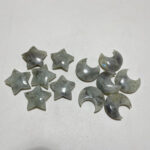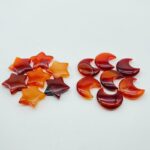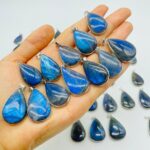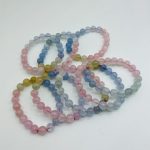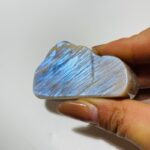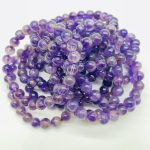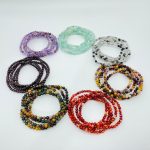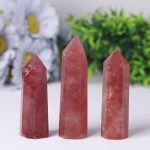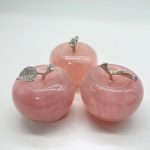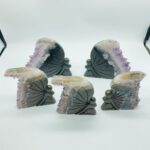Introduction
Fluorescent gems, also known as fluorescent minerals, are a fascinating and beautiful group of gemstones that emit light when exposed to ultraviolet (UV) radiation. This phenomenon, known as fluorescence, occurs when certain minerals absorb UV radiation and then re-emit it as visible light.
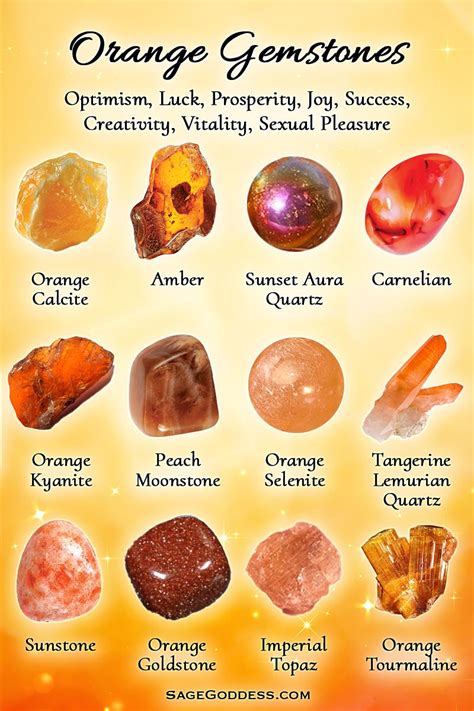
Gems That Fluoresce
- Alexandrite
Alexandrite is a rare and valuable gemstone that is known for its color-changing properties. It appears green in daylight but changes to red under incandescent light. This unique trait is caused by the presence of chromium impurities, which absorb specific wavelengths of light. Alexandrite also exhibits strong fluorescence under UV light, emitting a bright red glow.
- Fluorite
Fluorite is a common mineral that is found in a wide range of colors, including purple, green, blue, and yellow. It is also an excellent fluorescent mineral, emitting a bright blue or green glow under UV light. This fluorescence is caused by the presence of calcium and fluorine ions within the crystal structure.
- Scheelite
Scheelite is a calcium tungstate mineral that is typically found in white or yellow. It is also a strong fluorescent mineral, emitting a bright blue or white glow under UV light. This fluorescence is caused by the presence of tungsten ions within the crystal structure.
- Smithsonite
Smithsonite is a zinc carbonate mineral that is typically found in green or blue. It is also a fluorescent mineral, emitting a bright green or blue glow under UV light. This fluorescence is caused by the presence of zinc ions within the crystal structure.
- Willemite
Willemite is a zinc silicate mineral that is typically found in white or green. It is also a fluorescent mineral, emitting a bright green glow under UV light. This fluorescence is caused by the presence of manganese ions within the crystal structure.
Applications of Fluorescent Gems
Fluorescent gems have a wide range of applications, including:
Jewelry: Fluorescent gems are often used in jewelry, as their unique glow can add an extra touch of beauty and interest.
Lighting: Fluorescent gems can be used in lighting, as they can emit light when exposed to UV radiation. This makes them ideal for use in night lights, decorative lighting, and other applications.
Medical: Fluorescent gems can be used in medical applications, as they can help to diagnose and treat certain conditions.
Fluorescence vs. Phosphorescence
Fluorescence and phosphorescence are two similar phenomena that are often confused. However, there is a key difference between the two. Fluorescence is the emission of light by a substance that has absorbed UV radiation. Phosphorescence is the emission of light by a substance that has absorbed UV radiation and then continues to emit light for a period of time after the UV radiation has been removed.
Table: Overview of Fluorescent Gems
| Gemstone | Color | Fluorescence |
|---|---|---|
| Alexandrite | Green/Red | Red |
| Fluorite | Purple/Green/Blue/Yellow | Blue/Green |
| Scheelite | White/Yellow | Blue/White |
| Smithsonite | Green/Blue | Green/Blue |
| Willemite | White/Green | Green |
Customer Pain Points and Motivations
Customers who are interested in fluorescent gems may be facing several pain points, including:
- Lack of awareness about fluorescent gems
- Difficulty finding fluorescent gems
- High cost of fluorescent gems
Customers who are interested in fluorescent gems may be motivated by several factors, including:
- Desire for unique and beautiful gemstones
- Interest in using fluorescent gems in jewelry or lighting
- Need for fluorescent gems for medical applications
Market Insights
The market for fluorescent gems is expected to grow in the coming years due to increasing demand from jewelry, lighting, and medical industries. The market is also expected to benefit from rising awareness about fluorescent gems and their unique properties.
Current Status and Future Outlook
Currently, the market for fluorescent gems is relatively small, but it is expected to grow in the coming years. There are several factors that are driving this growth, including:
- Increasing demand for unique and beautiful gemstones
- Growing interest in using fluorescent gems in jewelry and lighting
- Rising awareness about fluorescent gems and their unique properties
New Applications for Fluorescent Gems
In addition to the traditional applications of fluorescent gems, there are several new and innovative applications for these materials. Some of these applications include:
Security: Fluorescent gems can be used in security applications, as they can be used to identify counterfeit goods or documents.
Sensors: Fluorescent gems can be used as sensors, as they can be used to detect specific substances or chemicals.
Lasers: Fluorescent gems can be used in lasers, as they can emit light at specific wavelengths.
Conclusion
Fluorescent gems are a fascinating and beautiful group of gemstones that have a wide range of applications. As the market for fluorescent gems continues to grow, it is likely that we will see even more new and innovative applications for these materials in the future.













